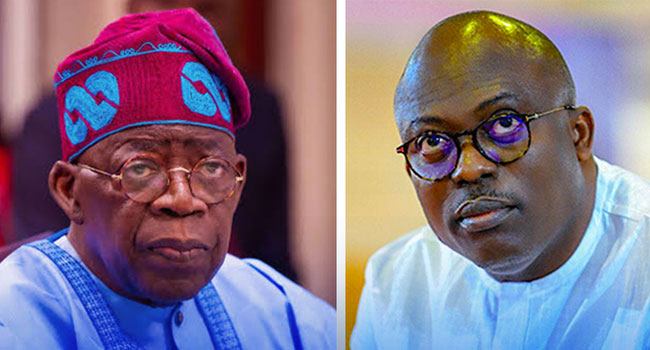Legal experts have challenged President Bola Tinubu’s decision to suspend Rivers State Governor Siminalayi Fubara, his deputy, Ngozi Odu, and state lawmakers for six months.
The announcement, made during a live national broadcast on Tuesday, has sparked debate among legal practitioners regarding the constitutional validity of such a move.
Tinubu justified his decision by citing the ongoing political turmoil in Rivers State, which has resulted from a rift between the governor and state legislators. He stated that the suspension was necessary to restore stability.
“By this declaration, the Governor of Rivers State, Mr. Siminalayi Fubara, his deputy, Mrs. Ngozi Odu, and all elected members of the House of Assembly of Rivers State are hereby suspended for an initial period of six months,” Tinubu announced.
The president also appointed retired Vice Admiral Ibok-Ette Ibas as the state’s administrator to oversee governance during this period.
READ ALSO: JUST IN: Tinubu Declares State Of Emergency In Rivers
“In the meantime, I hereby nominate Vice Admiral Ibok-Ette Ibas (retd.) as Administrator to take charge of the affairs of the state in the interest of the good people of Rivers State. For the avoidance of doubt, this declaration does not affect the judicial arm of Rivers State, which shall continue to function in accordance with its constitutional mandate,” he added.
Citing Section 305 of the 1999 Constitution, Tinubu asserted that declaring a state of emergency was necessary for restoring peace. He further stated that the proclamation had been published in the Federal Gazette and forwarded to the National Assembly for approval.
“This declaration has been published in the Federal Gazette, a copy of which has been forwarded to the National Assembly in accordance with the Constitution,” he said. “It is my fervent hope that this intervention will restore peace and order in Rivers State by reminding all political actors of their constitutional responsibilities.”
Legal Experts Question Tinubu’s Authority
However, legal professionals have expressed strong opposition to Tinubu’s actions, arguing that the president lacks the authority to suspend an elected governor.
Morakinyo Olasupo, a UK-based human rights lawyer, asserted that only a state’s House of Assembly and the judiciary have the constitutional power to remove a governor.
“The President cannot suspend a democratically elected governor. Governors hold a constitutional mandate, and their removal or suspension must follow due legal process,” Olasupo stated.
He outlined the legal avenues for a governor’s removal, including impeachment by the state House of Assembly (as detailed in Section 188 of the 1999 Constitution), court rulings on election petitions, death, or incapacitation.
While acknowledging that Section 305 allows the president to declare a state of emergency, he stressed that this does not grant the power to suspend elected officials.
“A state of emergency can only be declared in extreme situations—such as war, a total breakdown of law and order, or a public disaster,” Olasupo explained. “Even then, the president must seek approval from the National Assembly before implementing such measures.”
He also criticized the procedure Tinubu used, arguing that a mere broadcast does not constitute a valid declaration.
READ ALSO: Rivers Assembly Members Initiate Misconduct Proceedings Against Fubara, Deputy
“The state of emergency must be declared through a formal legal instrument, which is then sent to the National Assembly for deliberation and approval. Without this step, the declaration holds no legal weight,” he added.
Divided Opinions on Emergency Declaration
While Olasupo opposed Tinubu’s move, Ridwan Oke, Principal Partner at Iris Attorneys LP, partially supported the president’s decision. Oke agreed that the ongoing political crisis justified a state of emergency but maintained that suspending elected officials was unconstitutional.
“The 1963 Constitution provided for the suspension of a sitting governor, but the 1999 Constitution (as amended) does not,” Oke pointed out. “Therefore, the President lacks the legal authority to suspend the governor, deputy governor, and state lawmakers.”
Oke further explained that under Section 305, a state of emergency can only be declared if:
There is war or political unrest,
There is a breakdown or imminent breakdown of law and order, or
The state governor, backed by a two-thirds majority of the House, requests it.
Since Governor Fubara did not request a state of emergency, Oke argued that Tinubu could only declare a limited intervention, though the Constitution does not specify a time frame.
“The political crisis and recent explosions in Rivers State provide valid grounds for a state of emergency,” he noted. “However, the president must still submit his proclamation to the National Assembly for approval and deliberation.”

